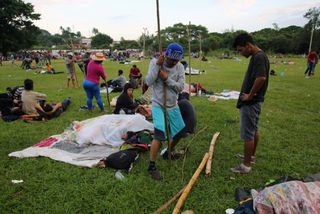Freudian Psychology
Beyond the Best Interests of the Migrant Child
What Anna Freud knew about traumatized children's needs.
Posted December 31, 2018

I’m guessing that the children in tent cities near the Mexican border didn’t follow Santa’s travels on the NORAD tracker the night before Christmas.
Since World War II, we’ve known that children living in institutions like those tent cities need their emotional lives tended to just as much as children living at home with their families do. It was Sigmund Freud’s daughter, Anna, who educated the world about children’s needs, in the book Beyond the Best Interests of the Child and in many others.
Anna’s life partner was Dorothy Burlingham. She was heir to the Tiffany fortune, and spent much of her money helping European Jews escape the genocide. In 1938, Anna and Dorothy fled with Anna’s family from Nazi-occupied Vienna to Hampstead, England. It’s a suburb of London. There, the two women established the Hampstead War Nursery, where they humanely housed and raised about one hundred infants and children. Tending to them, Anna and Dorothy established common-sense caregiving methods that, at the time, deviated from popular core beliefs.
Most adults in that pre-war era did not recognize that children could experience grief and depression, and so never imagined that adults can help them learn how to manage difficult feelings.
Anna and Dorothy were among a small cadre of educators, psychologists, and psychoanalysts who knew better.
For example, they were sure that periodic visits from living parents who had been grievously injured or who were fighting in the war were good for children, despite the fact that every separation could spin a child into another round of grief. Anna and Dorothy could see that children’s play signaled strong hints about their distress. They learned how to use play-derived insights to help children stay emotionally alive even when as bombs fell. Anna and Dorothy also guessed that, just as institutionalized children need beds to sleep in, they need laps to sit on. And so, at the Hampstead War Nursery, each child lived in a small group “family” led by a European immigrant who filled in lovingly for missing parents.
Thanks to Anna Freud and Dorothy Burlingham, we adults are supposed to be wiser than our predecessors were about children’s and infants’ needs. But the U.S. government has been moving children into huge tent cities under cover of night, and with no advance warning to them. They are separating desperately afraid brothers and sisters. They are housing children in huge, impersonal dormitories.
I don’t really know what kind of Christmas these children celebrated, but I’m sure it was unusual.
We are destroying these children’s neurological and psychological coping abilities just as they are being formed.
Christmas was not merry for those children. I wish them a far happier New Year.
References
Goldstein J, Freud A, Solnit AJ. Beyond the best interests of the child. Vol. 1. (1973) New York: Free Press.


